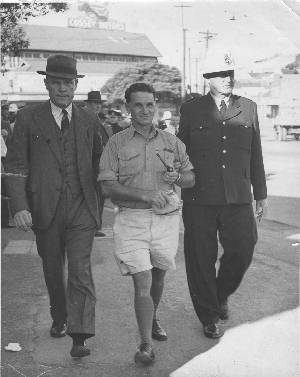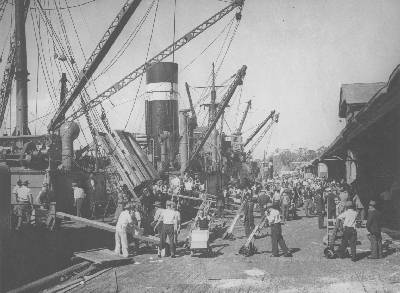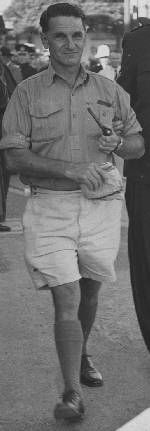The death in Brisbane on February 26 of Ted Englart, at the age of 85, reduces the ranks of the great trade union fighters who did so much to lay the foundations for communist influence in unions in the 30’s and 40’s.
Ted, along with Bert Field of the Metal Workers Union, Frank Wiegal of the Moulders, and rank and file communists in the tramways, railways, building, shearing, sugar and other industries, worked against massive odds with real tenacity and guts. This generation owes them a great debt.
Ted was born of pioneering farmer stock in Toowoomba in 1897. His grandfather migrated from Germany in the 1840s and worked as a shepherd for £12 a year plus tea, sugar, flour and meat.
On leaving the farm, Ted worked as a labourer, and finally joined the Waterside Workers Union in 1919 and the Communist Party in 1928.
These were bad days on the waterfront - dangerous gear, heavy hand trolleys, manhandling cargoes, long shifts, pick-ups at the gate, bull gangs, stand-over men, and slings to the foremen to get a start.
Ted was in the thick of the 1928 strike. He was a relentless pursuer of scabs. When the strike was broken, he and loyal unionists were savagely victimised.
He and his wife Kate faced several bitter and difficult years raising and feeding a family of six children. But they never lost their humour or enormous capacity to resolve difficulties.
Some of Ted’s exploits in outwitting debt collectors, creditors, landlords and hay and feed merchants ("a man’s got to feed his bloody cow so he can feed his kids...") and retaining his house with payments as low as possible and few and far between, are hilarious gems of working class humour and ingenuity.
W.W.F.
He was one of the small band in the industry who worked to get Jim Healy elected as federal secretary of the W.W.F. in the 30’s. Jim set out on a long range policy to unite all workers on the waterfront as a prelude to humanising the shocking conditions of work.
At first this was hard for Ted and his mates to grasp. Ted’s hatred of scabs and their so called union, the P&C, was deep seated and, on many occasions, physical.
After long and often emotional discussions, Ted saw the correctness of communist policy and, typically, plunged headfirst into the battle. He never budged an inch and, bit by bit, one by one, he won over the doubters. In the process he built an active party branch, sold the most papers and collected the most money for the party.
Sensing corruption in the union leadership at that time, Ted led a campaign to clean it up. Despite threats, and being leaned on by "heavies", he finally won through. He was elected Vigilance Officer in 1938 and Brisbane Branch Secretary in 1942. He was defeated by the N.C.C. in the cold war period of the 50s, and "took up the hook" again.
The Brisbane wharfies were a powerful force in all the struggles of the early post war years. They threw their weight into every major struggle, including the cause of Indonesian independence, the 1946 meat strike, the ‘48 rail strike, the ‘49 miners’ strike, and many others.
Ted was arrested under draconian anti-strike and anti-picketing legislation introduced by the Hanlon Labor Government to stop the Queensland Railway Strike (February - April 1948).
14 union officials were charged under Hanlon's Industrial Law Amendment Act.
 Ted Englart being arrested 16 March 1948.
Ted Englart being arrested 16 March 1948.
In 1948, Ted, along with others, was arrested for his role in the rail strike. Even in jail he was irrepressible. On being released from the cell each morning, the prisoner had to salute the "screw". Ted always managed to have his "piss tin" in his right hand as he saluted.
Ted had his faults and failings but, above all, he was a courageous and compassionate person, filled till his last days with an unbounded optimism for the future and a deep faith in the working class. Some have called him naive, with a blind faith or a foolish utopian outlook. Some who said that went on to well paid jobs and became more and more cynical.
Poland
Three weeks before he died I had a few beers with Ted and his son, Vince. We had a wide ranging talk about socialism, Poland, imperialism, Reagan and the problems and difficulties in the communist movement. At the end of it he said, as I’ve heard Uncle Ted say for 50 years, "Yes, but things are going well despite it all and the workers will win".
That was Ted’s life - that is his epitaph.
Claude Jones
Letter from Pete Thomson to Kev Donovan
Tuesday, 16/3/1982
Dear Kev,
I'm hoping that, between all of us (starting with you) Ted Englart gets properly acknowledged in Tribune this week for the person that he was. He would be totally unknown to most of the Left youngies. In fact, a lot of the Left youngies (and it's not their fault) are totally unknowing of the times in which the Ted Englarts were the people who they were.
Anyway, the obituary of Ted was a sort of chain reaction. First of all, it was you who let Tribune know about his death and sent the Ship & Shore. By chance, I was in the Tribune office and happened to see the type-set bit about Ted. So I went off and added a few bits particularly about Ted in tho 1948 Queensland rail strike and his jailing and so on. I also went home to do a rummage and found the pamphlet with the picture of Ted, Max Julius and Mick Healy when they were released from jail and turned up at the Trades Hall. On that day, we'd already got out our weekly Qld Guardian but, when we heard that Ted and Max and Mick had been let go from Boggo Road (the money for -their fines had mysteriously turned up in an envelope in some Government Office), we got out a helter-skelter special edition of the Qld Guardian with a banner headline (Ted Bacon wrote it) saying: HANLON PAID THE FINES. And the photograph of the Trades Hall welcome home to Ted and Max and Mick was taken for that special edition of the Qld Guardian. I'm very attached to that picture: Ted, Max and Mick themselves plus Ron Brown and Clarice, Kath, Frank Nolan, Mick: O'Brien, Arch Nicol, others, and even a younger me.
So, having found this picture and added a bit to Ted's obituary I then found that Claude Jones had sent his own obituary of Ted to Tribune (I'd forgotten that Claude was a nephew of Ted). Claude's tribute to Ted was really good: it wrote about Ted as Ted really was. So I promptly advocated that Trib scrub what I'd done and use Claude's letter, plus the 1948 Trades Hall picture. I hope that Trib has complied... Anyway, you and Claude and I have tried to see that Ted Englart has his proper recognition in Tribune.
He was such a character in his own right. Always wearing shorts, long before shorts became permissible wear. Always selling Tribunes or Guardians or anything else from the Party. Always totally ready to do battle for Party policy. What he did in organising the wharfies’ stevedoring of that Tasmanian fruit ship (it's mentioned in the Ship & Shore tribute to Ted) was an example of ‘workers control’ long before the term of 'workers control' had been invented.
1946 - Wharfies unloading apple and pear boat S.S. Murada

The wharfies appointed their own foremen and proved that they were not only concerned with the needs of the public but also that they could run the ships themselves.
(72KB in 2 JPEG files)
I ran into Ted a few years ago in Brunswick Street (Ted in his shorts, as always). That’s the only time I've seen him in maybe 20 or 30 years. But I still feel a very keen sense of loss about Ted’s death. He was a stalwart in our besieged days of the cold-war period. He was also such a unique person.
This isn't the cheeriest of letters, is it Kev, but I wanted to let you know that we - you, me, Claude - had all tried to have a proper recognition of Ted Englart.
Pete
By Alby Graham, former Brisbane Branch Assistant Secretary

After a fairly long illness, E.C. (Ted) Englart died. He had reached the mid-eighties.
Ted was a waterside worker for most of his working life, having joined the Waterside Workers’ Federation of Australia, Brisbane Branch, in the early twenties.
His main activities belonged to an era, way back beyond the experience, and remembrance of many of today’s union members - although there are still those about, not too many, who worked with him and knew him personally; and there are many members spread throughout the Branches of the Federation who knew him personally and many who knew him by repute.
He held many official positions in the Union, at Branch, State and National level.
Ted was Brisbane Branch Secretary for well over a decade, and preceded that office as Vigilant Officer, a position he held to the extreme discomfort of the bosses who, at that time, had had a fairly easy period until his elevation to office.
The severe setback to the Federation as a result of the 1928 strike, during which the Federation was disunited, disorganised and in disarray, gave the bosses an armchair ride, which they thought would last forever.
But then came Ted Englart
In addition to his Branch positions, Ted Englart also held the position of Secretary of the Queensland State Executive of the W.W.F. of Australia operating in that period and was the Queensland representative in the Federal Committee of Management (each State had but one representative), which was the forerunner of the present Federal Council.
During the period the bosses were on top - and they were completely so at that time, owing to the absence of any effective organisation on the Brisbane waterfront - Englart worked relentlessly, organising and uniting the workers in their own defence.
To Leadership
His job was a tremendous one, being almost a lone fighter and leader with little, but some, support because, at the time, it was distinctly unfashionable for anybody who wanted to work on the wharves to show any pro-union or anti-boss tendencies.
Englart persisted and prevailed, gradually earning recognition and support, because of his energy, his efficiency, his dedication and loyalty to his class.
And so the workers elected him as their leader, first as Vigilance Officer and then as Branch Secretary.
His political affiliation was with the Communist Party of Australia, both during its illegal period and since.
Many gains
Although the first round against the shipowners had been won, Ted never tired of appealing to the workers to maintain their unity and to strive for the final goal of socialism.
As Branch Secretary, he gave leadership that resulted in very many improvements some of which should be recounted.
Among his achievements, based on his leadership, was the introduction of the Smith freezer boot (displacing the old and filthy toe rags).
First Aid
Brisbane had the first, boss recognised Union First Aid Organisation on the waterfront.
Short shifts were introduced and imposed upon the bosses by Union action, equal day and night shifts were the order of the day, plus many other progressive reforms.
He was the initiator of moves resulting in Brisbane members owning their own offices and licensed Club.
Alongside these activities he recognised the necessity of maintaining and strengthening links with fellow workers and supporting their causes, resulting in the Brisbane Branch making common cause with the Queensland railwaymen, 1948, and the A.M.I.E.U. (Metalworkers) during their struggles.
Gaoled
The Queensland Railway strike in 1948 resulted in anti-picketing legislation being enacted by the then Queensland Labor Government against the workers.
Defying the requirements of the anti-worker law, with many others, and continuing his leadership on the picket line in support of the striking railwaymen, Englart, with four other comrades (Max Julius, Charley Graham, Joe Esler and Mick Healy), went to gaol.
Ted Englart often said their incarceration wasn’t any easier by reason of the fact that they were in "boob" through defying anti-worker laws enacted by a Labor Government.
Dutch Boycott
His leadership and participation in the struggle by the Indonesian peoples against Dutch Imperialism, fighting for national independence and political democracy is well known, and favourably commented on by the author of "Black Armada", the historical record of that international working class battle.
Courageous
Ted Englart was recognised by all who knew him as a courageous man.
He spent a long time in the maritime industry with hook in belt, and as an official of the W.W.F. of Australia.
He was never a "middle of the road" man. He knew, in a class society, one took sides. That was Englart.
The importance of making common cause with other workers was always stressed by him, based on his knowledge that a defeat anywhere threatened the chances of success everywhere.
For Peace
Knowing the terrible futility and horror of war he was always prepared to debate those who argued "Peace wasn’t Trade Union Business".
"Red Ted" was a loving and much loved family man, who held the love and loyalty of his wife Katie (who pre-deceased him), his sons, daughters and their children.
So I extend my own ( and on behalf of all his friends), deepest sympathy and sincere condolences to his family and their families.